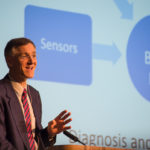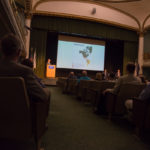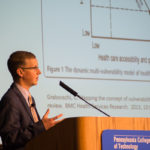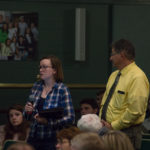Colloquium Panel Explores Cross-Cultural Access to Medical Care
Published 10.25.2017
News
Alumni News
Events
Student News
Faculty & Staff
Engineering & Industrial Design Technology
Industrial, Computing & Engineering Technologies News
Millions around the world are suffering the symptoms of serious or terminal illnesses, yet only one in 10 has access to effective pain management tools.
Three local experts teamed to explore what tools might be used to extend palliative care to areas within the United States and beyond that have few resources, presenting their findings during the latest edition of the Technology & Society Colloquia Series.
Thomas E. Ask, professor of industrial design at Pennsylvania College of Technology; Dr. John Boll, associate director of the Williamsport Family Medical Residency at UPMC Susquehanna; and Dr. Alexander Nesbitt, UPMC Susquehanna’s medical director for Susquehanna Hospice, Supportive and Palliative Care and Gatehouse Inpatient Hospice Unit, presented “Medical Care on the Edge: Redesigning Care Across Cultures” in the Klump Academic Center Auditorium on Tuesday.


 “Forty million people die (each year) without help,” Nesbitt said.
“Forty million people die (each year) without help,” Nesbitt said.
Technology could be explored either to extend the care that humans are doing: help them to reach more people or to care for them better, or to replace human care. Any solution, though, must focus on the patient and his or her dignity, Boll said.
Some technology already at work at the Shirati Hospital in Tanzani includes bicycles and cellphones employed by volunteers to reach surrounding villages and call the hospital staff if someone needs immediate medical attention. In rural areas of developed countries, telemedicine, allowing a face-to-face online chat with a doctor, also has potential.
More high-tech solutions that might be put in play in the future, as presented by Ask, include the use of neural networks programmed with ethnographic and other data to analyze symptoms and determine a person’s palliative care needs.
Ask addressed some of the problems with such a “deep-learning” machine:

 The answer, the group concludes, is that technology detracts from care when loving, caring humans are removed from the picture.
The answer, the group concludes, is that technology detracts from care when loving, caring humans are removed from the picture.
“Only another human can understand suffering,” Nesbitt said.
“It’s really a loving caregiver that is the best tool for delivering palliative care,” Ask concluded. “Technology should go through a caregiver. … There is a place for people among the machines.”
The talk has been posted to Penn College's YouTube channel:
http://www.youtube.com/watch?v=dnZUikIpyw8
Three local experts teamed to explore what tools might be used to extend palliative care to areas within the United States and beyond that have few resources, presenting their findings during the latest edition of the Technology & Society Colloquia Series.
Thomas E. Ask, professor of industrial design at Pennsylvania College of Technology; Dr. John Boll, associate director of the Williamsport Family Medical Residency at UPMC Susquehanna; and Dr. Alexander Nesbitt, UPMC Susquehanna’s medical director for Susquehanna Hospice, Supportive and Palliative Care and Gatehouse Inpatient Hospice Unit, presented “Medical Care on the Edge: Redesigning Care Across Cultures” in the Klump Academic Center Auditorium on Tuesday.


 “Forty million people die (each year) without help,” Nesbitt said.
“Forty million people die (each year) without help,” Nesbitt said.Technology could be explored either to extend the care that humans are doing: help them to reach more people or to care for them better, or to replace human care. Any solution, though, must focus on the patient and his or her dignity, Boll said.
Some technology already at work at the Shirati Hospital in Tanzani includes bicycles and cellphones employed by volunteers to reach surrounding villages and call the hospital staff if someone needs immediate medical attention. In rural areas of developed countries, telemedicine, allowing a face-to-face online chat with a doctor, also has potential.
More high-tech solutions that might be put in play in the future, as presented by Ask, include the use of neural networks programmed with ethnographic and other data to analyze symptoms and determine a person’s palliative care needs.
Ask addressed some of the problems with such a “deep-learning” machine:
- Do we program prejudice into the machine? Not all people from the same culture will experience the same suffering, despite similarities in disease.
- How do you protect the privacy of patient data collected by such a machine?
- Human nature: At what level does technology detract from care, making medicine impersonal and even dehumanizing?

 The answer, the group concludes, is that technology detracts from care when loving, caring humans are removed from the picture.
The answer, the group concludes, is that technology detracts from care when loving, caring humans are removed from the picture.“Only another human can understand suffering,” Nesbitt said.
“It’s really a loving caregiver that is the best tool for delivering palliative care,” Ask concluded. “Technology should go through a caregiver. … There is a place for people among the machines.”
The talk has been posted to Penn College's YouTube channel:
http://www.youtube.com/watch?v=dnZUikIpyw8